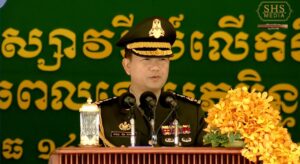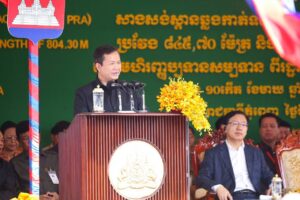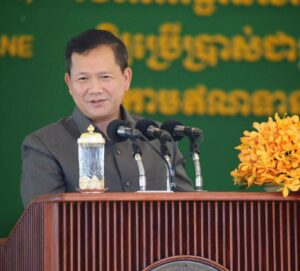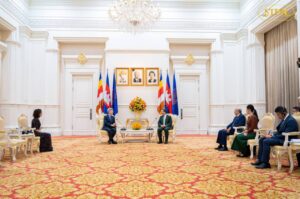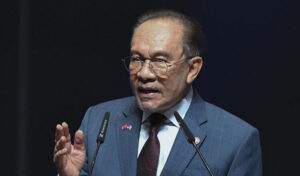(Video) Selected Comments of Samdech Thipadei Hun Manet, at the inauguration of the cement factory of Conch Cement factory of the Conch KT Cement (Phnom Penh) Company [Unofficial Translations]
![(Video) Selected Comments of Samdech Thipadei Hun Manet, at the inauguration of the cement factory of Conch Cement factory of the Conch KT Cement (Phnom Penh) Company [Unofficial Translations]](https://grandnewsasia.com/app/uploads/2025/05/photo_2025-05-20_11-53-10.jpg) (Video) Selected Comments of Samdech Thipadei Hun Manet, at the inauguration of the cement factory of Conch Cement factory of the Conch KT Cement (Phnom Penh) Company [Unofficial Translations]
(Video) Selected Comments of Samdech Thipadei Hun Manet, at the inauguration of the cement factory of Conch Cement factory of the Conch KT Cement (Phnom Penh) Company [Unofficial Translations]
[2]
(1) Anti-corruption, anti-Vietnam, anti-His Majesty the King (Norodom Sihanouk) were excuses to launch a coup on March 18, 1970
May 20, previously we called it the Day of Anger, has now been the day of remembrance of the millions of Cambodians who died in the Pol Pot genocidal regime of three years, eight months, and 20 days […] While it is a remembrance of the people who died in that regime, 20 May is also the day to remember the source of which the Khmer Rouge regime came […] The inauguration today has an important meaning because it falls on a day that remembers the painful past. We must remember not to be divided (again). The national division (occurred) under the banner of anti-corruption, anti-Vietnam, anti-His Majesty the King (Norodom Sihanouk), who led the country at that time, accusing His Majesty of allowing the Viet Cong to enter the country, etc. as an excuse for a coup on March 18, 1970. A decision made in a short moment, but millions of people died and it took almost 30 years to end the war […] Three days ago, we inaugurated the high school for Cambodian children in Veal Veng district of Pursat. Today we are inaugurating a cement production base in the Aural district of Kompong Speu province. This is the pride and fruit of peace […]
(2) Ending the war through win-win policy that guarantees life, property and position
It can be said that the win-win policy is more unique in this Aural region than in other regions. The ignition of peace that Samdech Techo established came out of the region of Aural firstly in February 1996. His Excellency Keo Pong announced the official integration of his division 18 into the government, and from there spread to other regions and ended in the direction of military region five […] which had opened the chance to search for peace to end the war through win-win policy, with the direct participation of the armed forces of all parties – the real operators […] by providing three guarantees – life, property and position. Only by doing this can we be honest with each other. If we were not honest with each other, the win-win policy could not succeed […] As the war ended, the government have been laying out policies, with which we can draw benefit from the natural resources and land that have been there for millions of years, to serve the nation, especially the communities and citizens at the local level, by build more connectivity infrastructure […]
(3) Letting no lives be destroyed by instability, loss of peace and recurrence of war
Aural is not only a place that connects Kampong Speu Province to National Road No. 4. We have a shortcut to National Road No. 5 and another road that Oknha Ly Yong Phat plans to build soon to connect to National Road No. 48 and on to Koh Kong […] This area could be an agro-industrial zone and/or more industries […] No country – either liberal, communist, or socialist – enjoys war or instability. When there is war, people die […] bridges which takes decades to build would be destroyed from dropping bombs in a second […] and a moment of fighting, hundreds of lives would end on the battlefield. Our country had gone through such a hard time in the recent past. We are not letting people’s lives be destroyed by instability, loss of peace and recurrence of war, but let’s create growth, economic activity and opportunities for our people, instead […]
(4) The cement factory – a mining sector, makes use of natural resources to serve the development of the country and the livelihood of the people
As the war ended with the achievements of the win-win politics in all areas, the mining sector started to grow step by step and received investment from foreign countries. The inauguration of the cement factory is (the business of) the mining sector, or rather, the use of natural resources to serve the development of the country and the livelihood of our people in a sustainable way. In the era of peace, we can transform our land that has no potential, no economic value (to the land) that we can use (to develop the country). There are natural resources, but we cannot make use of it because we had no opportunity and no ability to do so […] The win-win politics has made this place sustainable and so far, not only ending the war, but integrating our citizens everywhere, in every sector, with the potential to serve the nation […]
[3]
(5) Six cement factories so far produce 11 million tons per year for domestic demand and exports
Our country was able to produce cement for the first time in 1961, during the popular socialist era (of Samdech Preah Norodom Sihanouk as the head of state) […] Unfortunately, the war stopped the production […] In 1990s, we privatized this sector […] but, with dilapidated factories, […] the private companies stopped and handed it over to the state. We imported cement from abroad mainly […] It was not until 2007 that we were able to produce again. So far, we have six cement factories that produce 11 million tons per year. We can supply 100% to the domestic demand, and are able to export some […] For the future […] four licenses (of cement factories) have been reviewed. One has been under construction. That license continues. The other one is not in operation, and its license has expired. The other two are being evaluated whether to continue or not? […] I think the demand for cement in construction will increase […] as we continue to build physical infrastructure, roads, bridges, and highways […]
(6) Five benefits from quarrying for cement production
Some asked why Cambodia has to quarry mountains for cement production? Some people say that Cambodia has destroyed mountains and they have seen in China, they take care of mountains and plant vegetables […] surely, if you take pictures of mountainous areas where people are farming, you will see trees planted there […] Among the 10 ASEAN countries, none of them that does not mine […] Extracting mineral resources in the country has served a lot in development […] but we have to do it responsibly, and study the impacts. The benefits we get from mining help, firstly, reduce the import of raw materials; secondly, supply some raw materials locally, like cement; […] thirdly, it is not only raw materials, but also state income, a form of royalty; […] another point of interest is it creates jobs. In fact, our mining sector nationwide has more than 13,000 workers […] In addition, there is also direct participation in strengthening communities, not only by paying salaries, but also by providing some financial assistance to develop communities […]
(7) Conch-KT Cement to create more jobs, think of the workers’ well-being, and contribute to community for living together and sharing life
Living together and sharing in life […] means whether the investment company is from China, the technical workers are from China, from Cambodia, from any country, as long as they work together, they must create harmony, solidarity […] thinking about helping the people living around the area, including the community. This is our model of development, especially when it comes to partnership with the private sector. The private sector has its own fund – a social assistance fund (in which there are many companies in it). Every year, they put a percentage of their profits into the social budget to help schools, help the poor, help workers in difficulty, or help other communities […] I encourage Conch-KT Cement to continue to think about helping more, creating more jobs, thinking about the well-being of the people who work here, as well as contributing to the nearby community […] so that we can live together (and) share life […]
(8) “If development harms the interests and livelihood of the community, don’t do it”
Development must put the local people as the basis. If it harms the interests and livelihood of the community, don’t do it. On the contrary, do whatever you can to improve their livelihood. Having said this, it’s not that we don’t allow development, but we must maintain the value of the location. I have visited the spring water Te Teuk Puh and the ecosystem of Khnong Phsa. I have instructed concerned institutions to cancel some licenses that are intended to take the public location for development […] I do not prohibit, I do not revoke (the license, but) we adjust […] to provide warmth and additional potential to the local people […]
At the top of mountain “Khnong Phsa,” I have instructed concerned institutions to cancel the project up there […] leaving the place for public camping. Don’t let the private sector invest there […] firstly, concerned government institutions have to invest (some basic things to help them); and secondly, teach (the community how to provide tourism services) […] if the place is small, let us leave it for the community to do it. If the place is big, and the community cannot do it themselves, we then think of outside help […] Most importantly, let us teach the community how to do business […]
(9) Once outside investment comes in the place loses its value and the community loses income alternative
On the map, I thought that perhaps we have to bring to them investment, but when I was there, I realized that it is not the case. Once outside investment comes in, (the tourism activity in the community) will be dead. Firstly, the value of the place will be lost, and no one comes anymore if the public camping place turns into a resort; and secondly, the community will have difficulty (as they are losing their income source) […] We help improve based on what is available locally. Don’t do it for them. We work with them to do and they can use that help. This is the formula for developing eco-tourism areas that we need to preserve and develop together for the community […]
(10) Turning former battlefields into places of hope and safety is to instill freedom of citizens to travel, to live and make a living, to practice religion and to receive health care and education
(We can organize tourism activities in such a way) to connect the spring water of “Te Teuk Puh” with “Knong Phsa,” and maybe with the ecotourism sites in “Tpong” district later […] The Provincial Office of Tourism, the Provincial Office of Environment, and their line ministries, should not focus just on foreign tourists. Let us see more potential of domestic tourists […] Connecting blood vessels and turning former battlefields into places that give hope and provide safety […] is the actual implementation of the freedom of citizens – the right to travel, the right to live and make a living, the right to practice religion and the right to receive health care, education […] Obviously, these are the rights of citizens in a democracy […]
(11) Once mining licenses are granted, monitoring and inspection on the operation must be conducted regularly
I am asking the Ministry of Mines and Energy, as well as relevant authorities, the Ministry of Environment, to continue to pay attention to managing mining operations in all places of all types with high responsibility, taking into account the environment, sustainability, and the impact on the people. Please study thoroughly before granting licenses. Once licenses are granted, monitoring and inspection on the operation must be conducted regularly in accordance with the set principles (and guidelines) […]
May I ask the Ministry of Mines and Energy, the Ministry of Water Resources, and the Commission for the Business Management, especially regarding the river sand, to examine and study before pumping sand to avoid doing it in the wrong place or with technical errors that cause landslides. I have asked to study a formula for working with the private sector, considering dredging sand in the upper Mekong River at Kratie province and Kampong Cham province, which has overgrown heavily, changing the water flow, hitting and eroding the bank on the lower parts […] Please find a formula (which is suitable both technically and cost-effective to dredge sand in the upper Mekong River […] in the formula of a win-win investment […]./.

